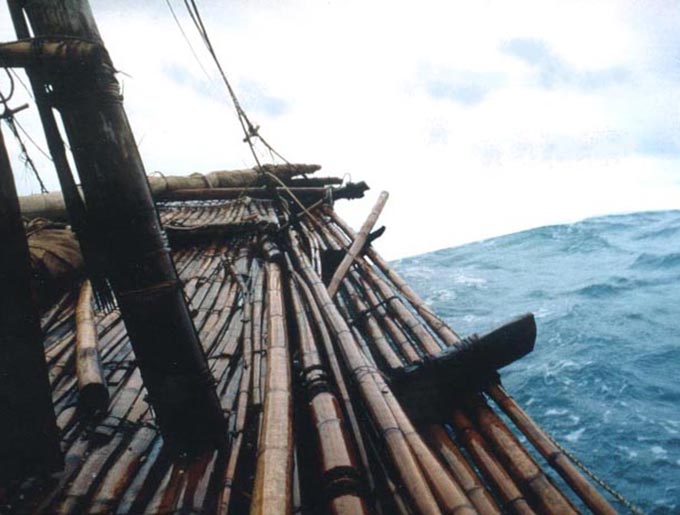By Djemi Amnifu in Jakarta
A group of sailing enthusiasts attempting to conduct a rafting expedition from the Timor Sea to Darwin, Australia, has been deported from Kupang, East Nusa Tenggara (NTT), in the latest wave of stricter measures applied by the government on research conducted by foreign nationals in Indonesia.
The Kupang Immigration Office in NTT ordered an expedition team consisting of five Australians and one Dutchman to return to their countries of origin on February 12, putting a halt to their journey.
Project director Robert Hobman, who has since 1998 engaged in an expedition to explore on how humans walked out of Africa to become the world’s first community of sea people, was shocked by the deportation.
READ MORE: Crossing the Timor Sea by Middle Paleolithic raft
He did not even realise that he had been deported as he had only been given an Exit Permit Only (EPO) by immigration officials to indicate an order to “leave Indonesian territory within seven days”.
In an email exchange with The Jakarta Post, Hobman said he had been told about his deportation days after he had left.
“Yesterday [Monday], we were given the green light by the Indonesian Consular staff in Darwin to apply for fresh visas. Early this afternoon, Jakarta advised that we have indeed been deported, not to return to Indonesia. Not until a review – I suppose on appeal – next July,” he said on Tuesday.
Hobman founded the First Mariners, a scientific reenactment of man’s first encounter with the sea. By reconstructing watercraft and voyages and becoming as familiar to them as ancient seafarers traveling from Africa to Australia.
Timor Sea projects
The first two projects were done in 1998, both attempting to cross the Timor Sea from Rote Island to Darwin. Both were unsuccessful.
In 2000, they successfully reached Lombok by crossing Lombok strait from Padangbai harbor in Bali.
In 2013 and 2014, the group managed to cross from Kythira Island to Crete Island in Greece. The First Mariners resumed the Rote-Darwin project in 2016, starting from harvesting the raft’s giant bamboo in Kupang.
The group was first detained by Kupang immigration officials on January 17 in Oeseli village, Rote Ndao regency, after hearing from the Rote Ndao Foreigner Supervision Team that six foreigners were making a bamboo raft to cross the Timor Sea to Darwin.
The officials said they had considered it an archaeology research project. However, the project was not supported by a permit, said Kupang Immigration Office head Sjachril.
“Based on Law No. 11/2019 on the national system of science and technology, any research conducted by foreigners or foreign institutions requires a permit from the Research and Technology Ministry and National Research and Innovation Agency [BRIN],” he said.
The Kupang Immigration Office later acted on its authority to carry out administrative measures on foreigners violating Indonesian laws and regulations, according to Article 75 of Law No. 6/2011 on immigration.
“That measure was deportation,” Sjachril said.
No record
Heri Hermansyah, the intellectual property management director of BRIN, said there was no record of Hobman and his other colleagues in the agency’s archive.
“Glenn Marshall [one of the expedition team members] once got a three-month research permit in NTT, but that was in 2012,” he said.
Hobman said Marshall’s permit in 2012 had no connection to their latest project.
The requirements for a research permit is detailed in Government Regulation No.41/2006.
A research permit guidebook released in 2016 also stipulates that foreign researchers must acquire a limited-stay visa to conduct research in Indonesia.
The process of obtaining a research permit can be long and complex, requiring approval from 10 different agencies, including a research notification letter issued by the Home Ministry and a traveling licence from the National Police. Some researchers may decide to arrive on a tourist visa instead to save time and avoid the hassle.
Last year, the Immigration Office denied entry to Dave McRae and Ross Tapsell, both renowned Australian scholars, because of alleged tourist visa violations.
Not research project
Hobman, however, said the raft expedition was not part of a research project.
“I have no academic qualifications but nonetheless consider myself as a maritime historian […] Glenn Marshall has an unused degree in geology but is a contractor […] We are all keen sailors.”
A spokesperson for the Australian Embassy in Jakarta said Australia’s Consulate-General in Bali has provided consular assistance to five Australians but for privacy reasons, the embassy could not provide further details.
“The matter of visas and research permits is one for the Indonesian government,” the spokesperson said.













































